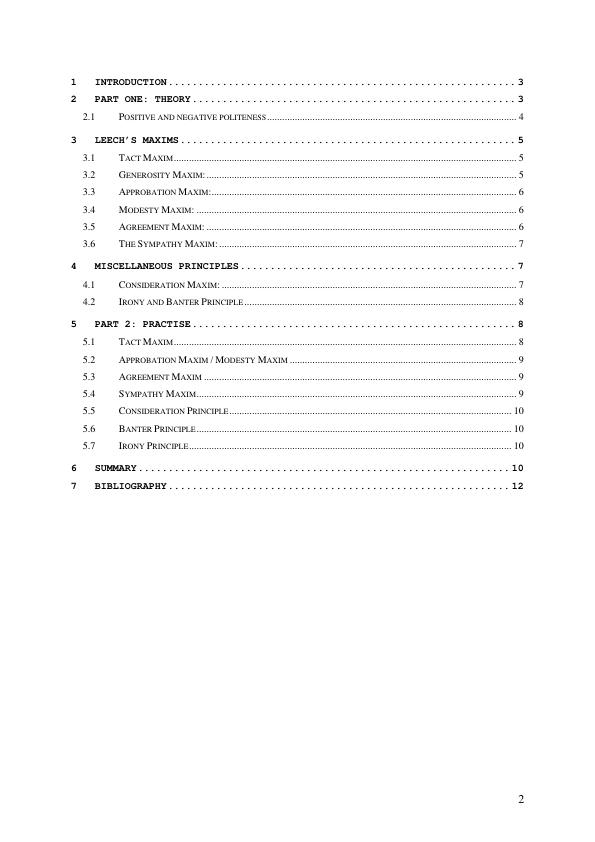The following term paper deals with Leech’s Politeness Principle and the Maxims of Politeness, especially with its appliance on children’s books.
I think it is a quite interesting theme to analyse children’s books according to politeness.
At a first step I would like to show the coherence between the Politeness Principle and Gricean’s Cooperative Principle, and to show problems with the CP.
Next I want to give a short overview about positive and negative politeness and about the Politeness Principle itself. After that I would like to point out the six main maxims: Tact Maxim, Generosity Maxim, Approbation Maxim, Modesty Maxim, Agreement Maxim, and Sympathy Maxim. Further I also want to give a short overview about the Miscellaneous Principles: Consideration, Irony and Banter.
After explaining the maxims I would like to find examples, where these maxims are broken. The resource for these examples is Lewis Carroll’s book Alice’s Adventures in Wonderland.
In a last step I want to give a short summary about how analysing the book functioned and whether Leech’s Maxims can be adapt to children’s books.
Inhaltsverzeichnis (Table of Contents)
- PART ONE: THEORY
- POSITIVE AND NEGATIVE POLITENESS.
- LEECH'S MAXIMS
- INTRODUCTION
- TACT MAXIM.
- GENEROSITY MAXIM:
- APPROBATION MAXIM:.
- MODESTY MAXIM:
- AGREEMENT MAXIM:
- THE SYMPATHY MAXIM:
- MISCELLANEOUS PRINCIPLES
- CONSIDERATION MAXIM:
- IRONY AND BANTER PRINCIPLE
- PART 2: PRACTISE
- TACT MAXIM.
- APPROBATION MAXIM MODESTY MAXIM
- AGREEMENT MAXIM
- SYMPATHY MAXIM.
- CONSIDERATION PRINCIPLE..
- BANTER PRINCIPLE.
- IRONY PRINCIPLE..
- SUMMARY.
Zielsetzung und Themenschwerpunkte (Objectives and Key Themes)
This term paper examines Leech's Politeness Principle and its application to children's literature, specifically focusing on Lewis Carroll's "Alice's Adventures in Wonderland." The paper aims to:- Connect the Politeness Principle to Gricean's Cooperative Principle.
- Provide an overview of positive and negative politeness.
- Outline the six main maxims of the Politeness Principle: Tact, Generosity, Approbation, Modesty, Agreement, and Sympathy.
- Explore additional Miscellaneous Principles such as Consideration, Irony, and Banter.
- Analyze instances where these maxims are broken within "Alice's Adventures in Wonderland."
Zusammenfassung der Kapitel (Chapter Summaries)
- Introduction: The paper introduces Leech's Politeness Principle and its application to children's literature, focusing on "Alice's Adventures in Wonderland." It also discusses the relationship between the Politeness Principle and Gricean's Cooperative Principle, highlighting potential issues with the latter.
- Positive and Negative Politeness: This section defines politeness and the Politeness Principle, differentiating between positive and negative politeness. It explores how these concepts relate to the speaker and hearer and the potential for misunderstandings in communication.
- Leech's Maxims: This section presents Leech's six main maxims of politeness: Tact, Generosity, Approbation, Modesty, Agreement, and Sympathy. Each maxim is explained, including its orientation towards the speaker or hearer and its role in maintaining social harmony.
- Miscellaneous Principles: This section expands on the Politeness Principle by introducing additional principles such as Consideration, Irony, and Banter, outlining their relevance in communication and how they can impact social interactions.
Schlüsselwörter (Keywords)
This preview explores the key concepts of politeness, language, communication, and literature, specifically focusing on Leech's Politeness Principle and its application in children's literature. The analysis examines various politeness maxims, such as Tact, Generosity, Approbation, Modesty, Agreement, and Sympathy, and their role in maintaining social harmony. The preview also explores the interplay between these maxims and the principles of Consideration, Irony, and Banter, demonstrating their impact on communication and social interaction.- Quote paper
- Annika Schario (Author), 2008, Politeness Principle, Munich, GRIN Verlag, https://www.grin.com/document/150093




